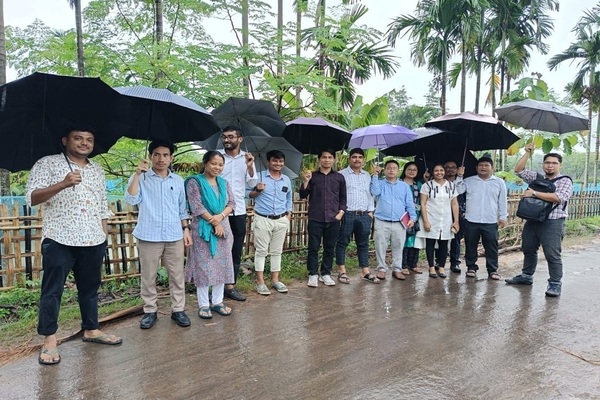
To overcome field level difficulties in respect to implementation of fishery-based livelihoods under the Tripura Rural Economic Growth and Service Delivery Project (TRESP), the Department of Fisheries, Government of Tripura, has taken a proactive, field-level strategy to identify areas within ADC (Autonomous District Council) areas that are potential for fish production.
As part of this initiative, a state-level training-cum-demonstration programme was successfully organized at the Directorate of Fisheries, Gorkha Basti, in collaboration with the Tripura Space Applications Centre (TSAC).
The programme was led by Samar Roy, Nodal Officer (Fisheries), TRESP, and Bishorjit Hijam, Fisheries Specialist, PMU.
Technical sessions were conducted by TSAC experts Singhajit Naorem and Basanti Tripura, and included participants from TRESP-focused blocks — specifically, District Fisheries Managers, Cluster Coordinators, and technical teams from all eight districts.
Following the training, a field-level geo-tagging demonstration was held at Phai Kwtal Producer Group, Mandwai Block, focusing on the digital identification and tagging of fishery ponds.
Naorem explained the step-by-step geo-tagging process, emphasizing its value in data collection, planning, and monitoring. Satellite imagery-based tools allow for the identification of producer group ponds, assessment of water retention capacity, and long-term tracking of changes in water bodies—facilitating data-driven decision-making and faster project implementation.
Importantly, the Project Implementation Unit of TRESP ,the Department of Fisheries is now actively working on the ground to pinpoint viable locations in remote ADC villages where fish farming can be promoted.
The department aims to establish well-structured producer groups in compliance with project norms, with a strong focus on maintaining quality.
However, in several TRESP operational ADC villages, the absence of suitable water bodies in terms of size or water availability in ponds have hindered the formation of producer groups.
To address the challenges , the department is focusing its efforts to identify alternative villages that meet the required fishery parameters, so that targets under the TRESP project can be achieved both qualitatively and within timelines.
With strong coordination between block and district-level TRESP staff, the department has entered mission mode, ensuring accelerated field-level activities, streamlined implementation, and inclusive development in fishery-based rural livelihoods.